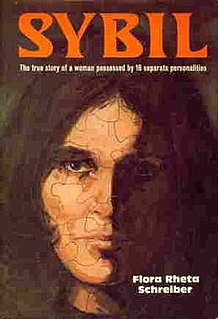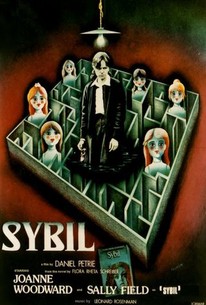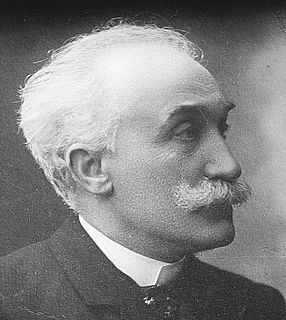| Look up selves in Wiktionary, the free dictionary. |
Selves may refer to:
| Look up selves in Wiktionary, the free dictionary. |
Selves may refer to:
| This disambiguation page lists articles associated with the title Selves. If an internal link led you here, you may wish to change the link to point directly to the intended article. |
Self-esteem is an individual's subjective evaluation of their own worth. Self-esteem encompasses beliefs about oneself as well as emotional states, such as triumph, despair, pride, and shame. Smith and Mackie (2007) defined it by saying "The self-concept is what we think about the self; self-esteem, is the positive or negative evaluations of the self, as in how we feel about it."

One's self-concept is a collection of beliefs about oneself. Generally, self-concept embodies the answer to "Who am I?".

Sybil is a 1973 book by Flora Rheta Schreiber about the treatment of Sybil Dorsett for dissociative identity disorder by her psychoanalyst, Cornelia B. Wilbur.

Sybil is a 1976 two-part, 3 1⁄4-hour American television film starring Sally Field and Joanne Woodward. It is based on the book of the same name, and was broadcast on NBC on November 14–15, 1976.

Justin Germain Casimir de Selves was a French politician.
Dry drunk is a colloquial expression that describes an alcoholic who no longer drinks but otherwise maintains the same behavior patterns of an alcoholic. The objective of groups such as Narcotics Anonymous (NA) and Alcoholics Anonymous (AA) is not just to help their members stop abusing drugs and alcohol. It is acknowledged in these programs that addiction is more systemic than a "bad habit" and is fundamentally caused by self-centeredness. Long term membership in Alcoholics Anonymous has been found to reform pathological narcissism, and those who are sober but retain characteristics associated with addiction are known in AA as dry drunks. The term is used by Alcoholics Anonymous in relation to feelings of anger, depression and resentment.

The Republic of Ararat, or Kurdish Republic of Ararat, was a self-proclaimed Kurdish state. It was located in eastern Turkey, centred on Karaköse Province. Agirî is the Kurdish name for Ararat.

Robin Alan Collins is an American philosopher. He currently serves as the Distinguished Professor of Philosophy and chair of the Department of Philosophy at Messiah College in Grantham, Pennsylvania. His main interests include philosophical issues related to the relationship between religion and science and philosophical theology.
Egonomics is a form of self-management first proposed by Thomas Schelling in his paper "Egonomics, or the Art of Self-Management." Schelling suggested that individuals suffer from a sort of split-personality disorder whereby the present self wants a specific thing but the future or past self wants a different thing. Both selves exist, but do not exist at the same time.
The sociology of human consciousness uses the theories and methodology of sociology to explain human consciousness.
Nikolas Rose is a British sociologist and social theorist. He is Professor of Sociology in the Department of Global Health and Social Medicine at King's College London, having joined King's in January 2012 to found this new Department. Previously he was the James Martin White Professor of Sociology at the London School of Economics, director and founder of LSE's BIOS Centre for the Study of Bioscience, Biomedicine, Biotechnology and Society from 2002 to 2011, and Head of the LSE Department of Sociology (2002–2006). He was previously Professor of Sociology at Goldsmiths, University of London, where he had been Head of the Department of Sociology, Pro-Warden for Research and Head of the Goldsmiths Centre for Urban and Community Research and Director of a major evaluation of urban regeneration in South East London.
Hazel Rose Markus is a social psychologist and a pioneer in the field of cultural psychology. She is the Davis-Brack Professor in the Behavioral Sciences at Stanford University in Stanford, California. She is also a founder and faculty director of Stanford SPARQ, a "do tank" that partners with industry leaders to tackle disparities and inspire culture change using insights from behavioral science. She is a founder and former director of the Research Institute of the Center for Comparative Studies in Race and Ethnicity (CCSRE). Her research focuses on how culture shapes mind and behavior. She examines how many forms of culture influence the self, and in turn, how we think, feel, and act.
The Seth Material is a collection of writing dictated by Jane Roberts to her husband from late 1963 until her death in 1984. Roberts claimed the words were spoken by a discarnate entity named Seth. The material is regarded as one of the cornerstones of New Age philosophy, and the most influential channelled text of the post-World War II "New Age" movement, other than the Edgar Cayce books and A Course in Miracles. Jon Klimo writes that the Seth books were instrumental in bringing the idea of channeling to a broad public audience.
True self and false self are psychological concepts, originally introduced into psychoanalysis in 1960 by Donald Winnicott. Winnicott used true self to describe a sense of self based on spontaneous authentic experience and a feeling of being alive, having a real self. The false self, by contrast, Winnicott saw as a defensive façade, which, in extreme cases, could leave its holders lacking spontaneity and feeling dead and empty, behind a mere appearance of being real.
Multiplicity, also known as plurality, is the psychological phenomenon in which a body can display multiple distinct personas. This phenomenon can feature in identity disturbance, dissociative identity disorder, and other specified dissociative disorders, among other things. Some individuals describe their experience of multiplicity as a form of neurodiversity, rather than something that demands a diagnosis. Since 1994, the Diagnostic and Statistical Manual of Mental Disorders (DSM) no longer refers to "multiple personality disorder", favoring other terms.

Orange is a Japanese romance manga series written and illustrated by Ichigo Takano, aimed at the shōjo and seinen demographics. It was first serialized in 2012 in Bessatsu Margaret manga magazine and later in Monthly Action. It has been compiled into 6 volumes as of 2017. Its chapters are published online in English by Crunchyroll and in print by Seven Seas Entertainment. It is also published in France by Akata, in Poland by Waneko, and in Spain by Ediciones Tomodomo. A live action film adaptation of the same name was released on December 12, 2015. An anime television adaptation started to air in July 2016. A spin-off to the manga began serialization on March 25, 2016, in the Monthly Action magazine published by Futabasha. An anime theatrical film, titled Orange: Future, premiered in Japan on November 18, 2016.

Invisibilia is a radio program and podcast currently produced and hosted by Alix Spiegel and Hanna Rosin for National Public Radio. Previous seasons were also hosted by Lulu Miller. The show debuted in early 2015, and "explores the intangible forces that shape human behavior—things like ideas, beliefs, assumptions and emotions." The program's title comes from Latin, meaning "all the invisible things". The Guardian ranked Invisibilia among "the 10 best new podcasts of 2015."
The psychological research on the future self examines the processes and consequences associated with thinking about oneself in the future. People think about their future selves similarly to how they think about other people. The extent to which people feel psychologically connected to their future self influences how well they treat their future self. When people feel connected to their future self, they are more likely to save for retirement, make healthy decisions, and avoid ethical transgressions. Interventions that increase feelings of connectedness with future selves can improve future-oriented decision making across these domains.
Saving Our Selves: A BET COVID-19 Relief Effort, or simply, Saving Our Selves, was a 2020 television special which aired on the American television network BET on April 22, 2020, during the COVID-19 pandemic. Hosted by Anthony Anderson, Kelly Rowland, Terrence J, and Regina Hall, the two-hour special was made to raise funds for the BET COVID-19 Relief Effort Fund, established by BET in collaboration with United Way Worldwide, aimed to support African Americans who have been severely impacted by the pandemic.